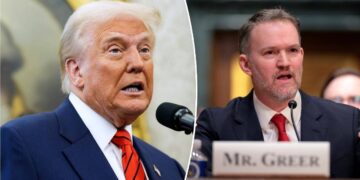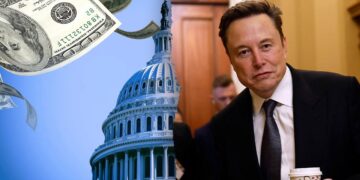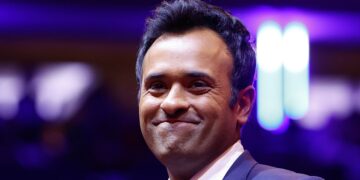The imposition of sanctions served as a wake-up call to the global community regarding the vulnerabilities associated with the dollar’s usage.
As a result, the BRICS alliance experienced a sudden and significant expansion, welcoming Argentina, Egypt, Iran, Saudi Arabia, and the United Arab Emirates into its fold.
This transformation has led to the incorporation of almost the entire global oil production and a substantial 40-45% proportion of the world’s Gross Domestic Product within the organization.
Mike Whitney interviews Dr. Paul Craig Roberts, a renowned author and academic, and chairman of The Institute for Political Economy.
Mike Whitney (MW): To what extent has the war in Ukraine accelerated the move to a new global realignment?
Paul Craig Roberts (PCR): It was Washington’s economic sanctions against Russia, the theft of Russia’s central bank reserves, and the theft of Venezuela’s gold, not the conflict in Ukraine, that weaponized the US dollar and resulted in global realignment.
The limited Russian intervention in Donbas was Putin’s belated eight-year-delayed response to the US coup that overthrew the government of Ukraine in 2014 and installed a government hostile to Russia and to the Russian population that had been incorporated into the Ukraine province of the Soviet Union by Soviet leaders. The intervention was forced on Putin by the United States’ buildup of a large Ukraine army poised to overthrow the self-declared Donbas republics.
By habit and convenience, the US dollar is used as world money to settle imbalances in international trade, but the sanctions woke the world up to the risks of using the dollar. Consequently, the BRICS suddenly expanded with membership extended to Argentina, Egypt, Iran, Saudi Arabia, and the United Arab Emirates. The organization now contains essentially the entirety of world oil production and 40-45% of World GDP.
Clearly, a realignment has already occurred.

MW: Iran, Saudi Arabia and UAE have now all joined BRICS. How will this affect the dollar’s role as the world’s reserve currency? (Is this the end of the petrodollar?)
PCR: Saudi Arabia announced the end of the petrodollar when it began accepting payment for oil in other currencies. The BRICS are working out how to carry on trade among themselves without use of the US dollar, which in effect brings to an end the role of the dollar as world reserve currency.
The BRICS might try to create a new reserve currency consisting of a weighted basket of their currencies. This is unnecessary and could lead to strains among BRICS members from disputes over the shares of each currency in the basket. A reserve currency is no longer needed. A reserve currency was needed at the end of WWII because the other industrialized economies were destroyed. As the US had the only intact economy, the role fell to the US dollar. Today this is not the situation. Central banks can keep their reserves in the form of the currencies of their trading partners.
What this means for Washington is that the US will begin having financing problems for its large budget and trade deficits. As long as the dollar was the world money, foreign central banks kept their reserves in US Treasury debt. As US budget and trade deficits grew, so did the reserves of the world banking system.
The situation is changing. If a dozen countries constituting about half of the world’s population and 40-45% of world GDP cease using the dollar, the foreign central bank market for US debt shrinks considerably. Having offshored its manufacturing, the US is import-dependent. Declining use of the dollar means a declining supply of customers for US debt, which means pressure on the dollar’s exchange value and the prospect of rising inflation from rising prices of imports.
MW: Can Washington allow this realignment to stand or should we expect to see a coup in Saudi Arabia where the US has five military bases and numerous CIA offices?
PCR: I do not know if Washington has the ability to overthrow the Saudi government or whether Russia, China, and Iran would permit it. Remember, President Obama was going to overthrow Assad in Syria, but Putin did not permit it.
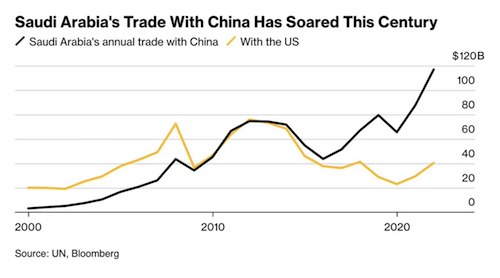
MW: The globalist dreams of the western oligarchs (WEF) appear to be coming to an end along with the so-called “rules-based order”. In your opinion, how important has Vladimir Putin been in spearheading the move towards a “new architecture for global security” and laying the groundwork for a new multipolar world order?
PCR: What broke up Washington’s version of global order was the West’s cold shoulder to Putin’s effort to be a part of the world order on equal standing and not in a subservient position. It was Washington’s arrogance and foolishness that broke up the global order.
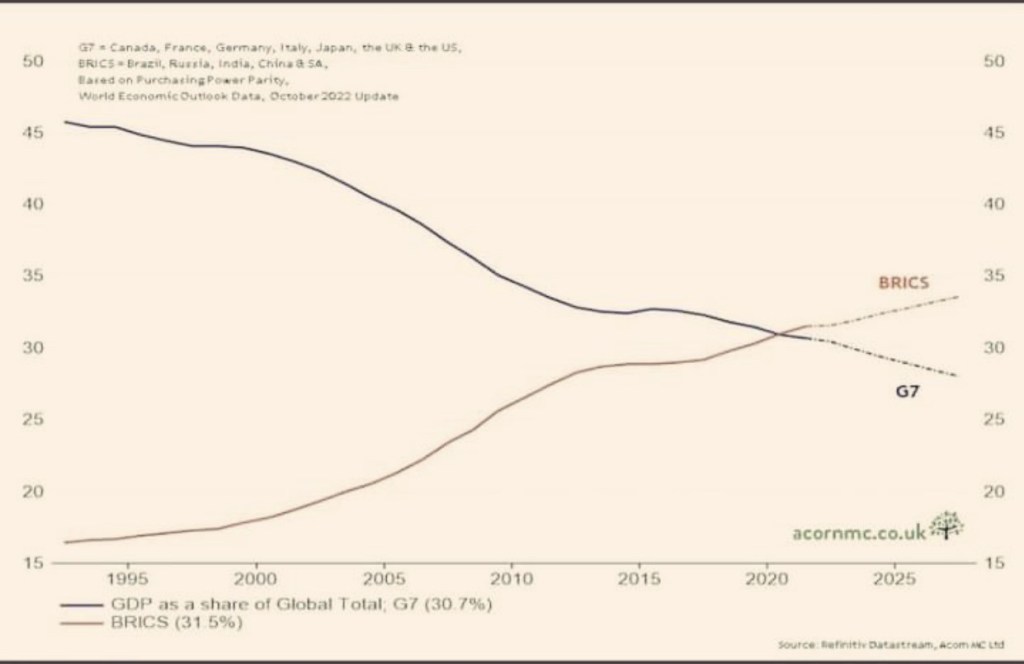
MW: Before he died, national security advisor Zbigniew Brzezinski warned that the US would need to seek an accommodation with Russia and China to ease the transition away from the unipolar system. Here’s what he said:
“As its era of global dominance ends, the United States needs to take the lead in realigning the global power architecture… the United States is still the world’s politically, economically, and militarily most powerful entity but, given complex geopolitical shifts in regional balances, i t is no longer the globally imperial power….
the United States must take the lead in realigning the global power architecture in such a way that the violence …can be contained without destroying the global order.…
a long and painful road toward an initially limited regional accommodation is the only viable option for the United States, Russia, China, and the pertinent Middle Eastern entities. For the United States, that will require patient persistence in forging cooperative relationships with some new partners (particularly Russia and China)…
The fact is that there has never been a truly “dominant” global power until the emergence of America on the world scene…. During the latter part of the 20th century no other power even came close. That era is now ending. Toward a Global Realignment, Zbigniew Brzezinski, The American Interest
In your opinion, how should the United States deal with Moscow and Beijing? Is there a way that we can defend US interests while –at the same time– avoiding years of conflict and confrontation? What should our foreign policy objectives be?
PCR: The neoconservatives’ goal of US hegemony prevents Washington from hearing Brzezinski’s advice. Washington’s chance to deal with Russia and China has passed. The question we face is how will Russia and China deal with Washington. The neoconservative monopoly on US foreign policy means that there are no other voices for Washington to hear, and American hegemony is out of the question.
The Pentagon is Yet to Make Some Adjustments
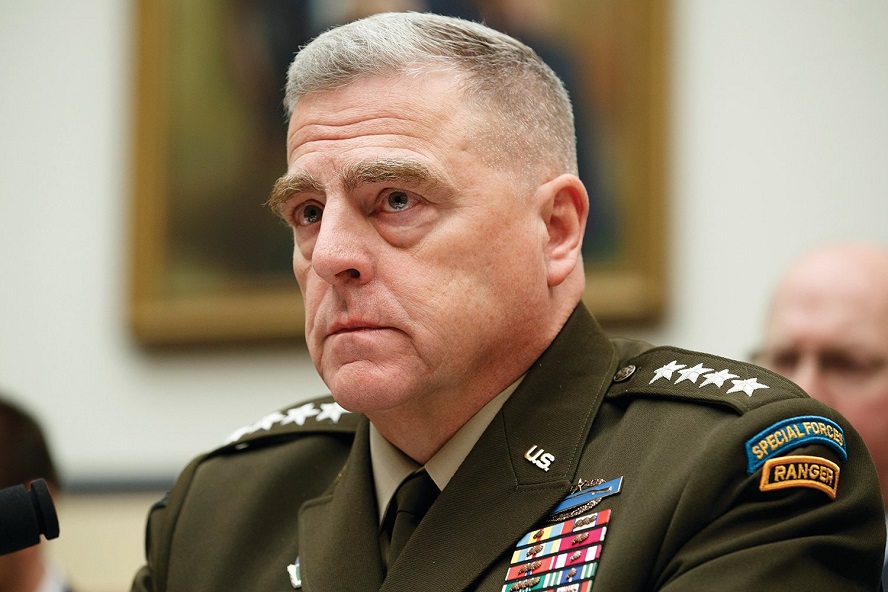
The highest-ranking military official of the United States expressed that the nation intends to uphold its military presence in the Middle East. General Mark Milley, Chairman of the Joint Chiefs, emphasized the significant role of the region in American foreign policy. Speaking on Jordan’s Al-Mamlaka TV, Milley conveyed,
“It’s difficult to envision the United States ever disengaging from the Middle East. Our commitment is expected to persist for many decades to come.”
Milley elaborated, highlighting the strong bonds and partnerships the U.S. has forged in the region. He underscored the importance of regional stability, considering its role as a primary supplier of oil and energy resources for other global areas. Milley emphasized that the Middle East carries substantial importance for the U.S. due to a variety of factors.
Throughout numerous years, Washington has utilized its military presence to exert influence over the Middle East. The U.S. has expended vast sums of money and been involved in multiple military endeavors spanning three decades.
Regrettably, these wars have fallen short of achieving the United States’ professed objectives of introducing peace, stability, and democracy to the Middle East. Instead, these conflicts, along with the U.S. support of various armed forces, have contributed to sectarian tensions and enabled oppressive governments to suppress their populations.
Presently, the U.S. maintains a significant number of troops across various countries in the Middle East, including Syria. General Milley remarked on the continuing presence of small groups of fighters in and around Syria and Iraq, emphasizing that a sudden withdrawal might allow groups like ISIS to regain strength. He acknowledged the improved situation but stressed the need for an ongoing commitment. This involves a modest U.S. military presence in Syria and Iraq.
However, American forces in Iraq and Syria frequently find themselves in confrontation not with jihadists, but with factions supporting the Syrian government. Additionally, incidents have occurred where U.S. warplanes operating in Syria have come close to clashes with Russian fighter jets.
It’s not about peace that US forces are in Syria and other territories in the Middle East. Here’s a verifiable data of its real activities in Syria:
- According to the Syrian Oil Minister Bassam Touma, 90% of Syria’s oil resources are under the control of Washington and its allies[1].
- MR Online reported that the US occupation forces in Syria have looted 89 oil tankers from Syria and smuggled them into Iraq through illegal crossings[2].
- The AANES admitted that oil and gas revenues amounted to about 156 billion Syrian pounds ($156 million) in 2019, more than 76% of which came from oil[3].
- The New Republic reported that the State Department, a conservative-connected shell company, and a key Kurdish crime family teamed up to siphon Syrian oil for US investors[4].
- An anonymous local source cited by SANA accused the US military of stealing 53 tankers of oil[5].
Sources:
[1] https://www.telesurenglish.net/news/Syria–Losses-in-Oil-Stolen-by-US-and-Its-Allies-Revealed-20210319-0021.html
[2] https://mronline.org/2022/08/16/u-s-troops-loot-84-oil-tankers-from-syria-smuggle-them-into-iraq/
[3] https://new.thecradle.co/articles/stolen-syrian-oil-the-fuel-for-syrias-partition
[4] https://newrepublic.com/article/158841/pompeo-trump-steal-oil-kurds-syria-iraq
[5] https://www.rfa.org/english/news/china/fact-check-01272023175615.html
[6] https://www.washingtonpost.com/world/2023/01/20/syria-fuel-crisis-oil-iran/






